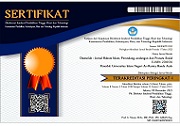CITATIONS
URGENCY OF RUNNING HANDLING IN DIVORCE CASE (Study of the Circuit Court Program at the Jantho Syar'iyyah Court)
Abstract
According to a 2007 study, the poor face major financial barriers to accessing the Religious Courts relating to court fees and transportation costs to come to court. The Supreme Court responded to these findings by paying great attention to the holding of circuit courts and waiving court fees with the Prodeo process. This response is manifested in the Supreme Court Circular (SEMA) Number 10 of 2010 concerning Guidelines for Legal Aid, which is divided into two attachments, namely attachment A for the General Courts and Annex B for the Religious Courts. Based on data from the Syar'iyah Jantho Court, the divorce case that occurred in Aceh Besar District was classified as high. The divorce rate is the number registered with the Jantho Syar'iyah Court, not including those who are not registered or divorce in secret without being registered with the Jantho Syar'iyah Court. Because traditionally, many people divorce without registering with the Syar'iyah Court, especially those whose social, educational and economic status is middle to lower, coupled with the long distance between their homes and the Syar'iyah Court. Therefore, the problems in this thesis are how the circuit court procedure in divorce cases at the Jantho Syar'iyah Court, how the community's participation in the implementation of circuit courts in divorce cases at the Jantho Syar'iyah Court and how the influence of circuit courts in the social life of the community. With the method of field research (field research) conducted at the Syar'iyah Jantho Court, the result of the research is that the procedure for conducting a circuit court consists of pre-trial stages, namely case registration, appointment of a panel of judges (PMH), appointment of a substitute clerk (PP) and a substitute bailiff. (JSP), Determination of Session Day (PHS), and Summons of the parties. The second stage of the trial is peace efforts, reading of lawsuit / petition, answer-answer, verification, deliberation of the panel of judges, reading of decisions / decisions, implementing the divorce vow and submitting divorce certificates. Insofar as it is implemented, community participation is very high so that it affects public awareness that the termination of a marriage relationship is very important to obtain legal certainty.
Keywords
Urgensi, Sidang Keliling
Full Text:
PDFReferences
DAFTAR PUSTAKA
Agustin Hanapi, Edi Darmawijaya, Dan Husni A.Djalil, Buku Daras Hukum Keluarga, Banda Aceh: 2014
Beni Ahmad Saebani, Fiqh Munakahat, Bandung: Pustaka Setia, 2001
Direktorat Jendral Badan Peradilan Agama Pedoman Sidang Keliling Pengadilan Agama Tahun 2013
Kompilasi Hukum Islam
SK KMA No 26 Tahun 2012, Standar Pelayanan Peradilan Agama
SEMA No 10 Tahun 2010 Tentang Pedoman Pemberian Bantuan Hukum
Data Pegawai Mahkamah Syar’iyyah Jantho
Wawancara dengan Jamaluddin Harun, Panitera Permohonan Mahkamah Syar’iyah Jantho, Selasa Tanggal 17 Juli 2018
Wawancara Dengan Abdullah. Hakim Mahkamah Syar’iyah Jantho, Senin Tanggal 06 November 2017
Wawancara Dengan Hadi. Wakil Panitera Mahkamah Syar’iyah Jantho, Selasa Tanggal 17 Juli 2018
Wawancara Dengan Ridwan. Hakim Mahkamah Syar’iyah Jantho, Selasa Tanggal 17 Juli 2018
DOI: http://dx.doi.org/10.22373/dusturiyah.v10i2.8113
Refbacks
- There are currently no refbacks.
Copyright (c) 2020 misran misran misran
Indexed by:
Tools:
All papers published in Dusturiyah: Jurnal Hukum Islam, Perundang-undangan dan Pranata Sosial are licensed under a Creative Commons Attribution-ShareAlike 4.0 International License. |
Office address: Fakultas Syariah dan Hukum Universitas Islam Negeri Ar-Raniry. Jl. Ar-Raniry, Kopelma Darussalam, Syiah Kuala, Banda Aceh, Aceh, Indonesia 23111. Email: jurnal.dusturiyah@ar-raniry.ac.id
situs toto slot gacor slot gacor situs toto















